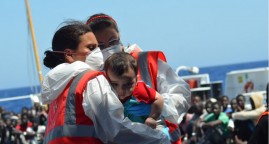Poorer countries host most of the forcibly displaced
Article published on UNHCR website on 02/27/2017
According to a new UNHCR study, most of the 3.2 million who were driven from their homes in the first half of 2016 found shelter in low or middle income countries.
Conflict, persecution and violence newly uprooted at least 3.2 million people in the first half of last year, and low- and middle-income countries played the greatest role in sheltering the world’s displaced, a new report by UNHCR, the UN Refugee Agency, has found.
In the first half of last year, 1.7 million people were newly displaced within their own country, while 1.5 million had crossed an international border, UNHCR’s Mid-Year Trends 2016 report shows.
While the numbers of newly displaced were one third lower than during the same period in 2015, when 5 million people were newly displaced, the global total continued to rise. Prospects for displaced people to return to their homes remained slim while conflicts intensified.
More than half the new refugees in the first half of 2016 fled Syria’s conflict, with most staying in the immediate region – Turkey, Jordan, Lebanon and Egypt. Other sizable groups fled Iraq, Burundi, Central African Republic, the Democratic Republic of the Congo, Eritrea, Somalia, South Sudan and Sudan.
While smaller in scale than the Syrian crisis, South Sudan’s refugee situation continues to grow and affect some of the world’s least developed countries – including Sudan, Uganda, Kenya, DRC, CAR, and Ethiopia. At mid-2016, there were a total of 854,200 refugees from South Sudan, a more than eight-fold increase in three years. Numbers grew even further in the second half of 2016.
Of all countries, Turkey sheltered the greatest number of refugees, hosting 2.8 million by mid-2016. It was followed by Pakistan (1.6 million), Lebanon (1 million), Iran (978,000), Ethiopia (742,700), Jordan (691,800), Kenya (523,500), Uganda (512,600), Germany (478,600) and Chad (386,100).
“Today we face not so much a crisis of numbers but of cooperation and solidarity – especially given that most refugees stay in the countries neighbouring their war-torn homelands,” said UN High Commissioner for Refugees Filippo Grandi.
By comparing the number of refugees to the size of a country’s population or its economy, UNHCR’s report brings the contribution made by host nations sharply into context. For example, relative to the sizes of their populations, Lebanon and Jordan host the largest number of refugees, while in terms of economic performance the biggest burdens are carried by South Sudan and Chad.
According to the latter economic measure, eight out of ten of the top countries hosting refugees are in Africa, with the remaining two in the Middle East. Lebanon and Jordan rank among the top ten hosting countries across all categories – absolute numbers, economic contribution and per capita.
At mid-2016, Syrians continued to be the largest group of refugees worldwide, making up 32 per cent (5.3 million out of 16.5 million) of the global total under UNHCR’s mandate.
Another key finding of UNHCR’s report was that submissions for resettlement increased, reflecting a rise in places allocated to the programme by a growing band of countries. More than 81,100 people were submitted to 34 states in the first half of 2016, with the final yearly figure having surpassed 160,000 – a 20-year high, and more than twice the number of submissions in 2012.
Related Articles
Vatican official: Europe not immune to anti-Christian discrimination
03/31/2017.Archbishop Paul Richard Gallagher called on an “institutionalized dialogue” at all levels between civil authorities and religious groups to help foster religious liberty.
H.E. Albrecht von Boeselager: The age of chivalry can show us how to help today’s refugees
12/23/2015. The Grand Chancellor of the Order of Malta expressed on the migratory crisis in Europe.
António Guterres’ risky balancing act
10/31/2019. Nearly at the end of the first three of his five-year mandate, Guterres’ performance at the head of an embattled UN remains the subject of much anxious debate.






